-
 Bitcoin
Bitcoin $84,975.0973
-0.30% -
 Ethereum
Ethereum $1,587.3346
-1.78% -
 Tether USDt
Tether USDt $0.9999
0.02% -
 XRP
XRP $2.0767
-0.59% -
 BNB
BNB $590.3985
-0.15% -
 Solana
Solana $136.7883
-1.52% -
 USDC
USDC $0.9999
0.02% -
 TRON
TRON $0.2466
1.66% -
 Dogecoin
Dogecoin $0.1557
-0.90% -
 Cardano
Cardano $0.6203
-1.64% -
 Chainlink
Chainlink $13.3687
3.06% -
 UNUS SED LEO
UNUS SED LEO $9.3251
0.20% -
 Avalanche
Avalanche $19.5152
-3.56% -
 Toncoin
Toncoin $3.0074
1.31% -
 Stellar
Stellar $0.2442
-1.65% -
 Shiba Inu
Shiba Inu $0.0...01240
0.81% -
 Hedera
Hedera $0.1669
0.13% -
 Sui
Sui $2.1105
-2.36% -
 Bitcoin Cash
Bitcoin Cash $335.5343
0.27% -
 Polkadot
Polkadot $3.9046
2.46% -
 Hyperliquid
Hyperliquid $17.7019
-1.69% -
 Litecoin
Litecoin $77.5194
1.99% -
 Dai
Dai $0.9999
0.01% -
 Bitget Token
Bitget Token $4.4018
-2.74% -
 Ethena USDe
Ethena USDe $0.9994
0.02% -
 Pi
Pi $0.6397
-1.48% -
 Monero
Monero $214.7168
1.68% -
 Uniswap
Uniswap $5.2780
-0.94% -
 Pepe
Pepe $0.0...07554
1.65% -
 Aptos
Aptos $5.0456
2.10%
What are the risks of Ethereum spot trading?
Ethereum spot trading offers substantial profit potential but carries significant risks, including extreme price volatility, liquidity issues on some exchanges, security breaches, regulatory uncertainty, operational glitches, and counterparty risk on decentralized platforms.
Mar 03, 2025 at 09:31 am

What are the Risks of Ethereum Spot Trading?
Key Points:
- Market Volatility: Ethereum's price is highly susceptible to market fluctuations influenced by various factors, leading to significant potential for both profits and losses.
- Liquidity Risk: While Ethereum is a large-cap cryptocurrency, liquidity can vary across different exchanges, potentially impacting the speed and price at which you can buy or sell.
- Security Risks: Trading involves entrusting your funds to exchanges or custodians, exposing you to the risk of hacks, scams, and platform failures. Proper due diligence is crucial.
- Regulatory Uncertainty: The regulatory landscape surrounding cryptocurrencies is constantly evolving, posing uncertainty and potential legal risks for traders.
- Operational Risks: Technical glitches, exchange downtime, or errors in your trading strategy can all lead to losses.
- Counterparty Risk: When trading on decentralized exchanges (DEXs), you are directly interacting with other users, increasing the risk of encountering dishonest or unreliable counterparts.
Unordered List of Detailed Risk Explanations:
- Market Volatility: Ethereum, like all cryptocurrencies, is known for its extreme price volatility. This means the price can swing dramatically in short periods, both upwards and downwards. Factors influencing this volatility are numerous and interconnected. News events, such as regulatory announcements, technological upgrades (or failures), market sentiment shifts driven by social media trends, and macroeconomic conditions (like inflation or interest rate changes) all play a significant role. A positive news story could lead to a rapid price surge, creating a buying opportunity, but equally, negative news or a sudden market downturn could result in substantial losses if you're holding ETH or leveraged positions. Understanding the drivers of this volatility is crucial for risk management. Technical analysis, fundamental analysis, and keeping abreast of market news are all vital tools for navigating this volatile landscape. The unpredictable nature of the market demands careful consideration of your risk tolerance and investment strategy. Day trading Ethereum, for instance, exposes you to far higher levels of volatility compared to a long-term hold strategy. Diversification across different asset classes, not just within the cryptocurrency market but beyond, can help mitigate the impact of extreme price swings in Ethereum.
- Liquidity Risk: While Ethereum is one of the most liquid cryptocurrencies, liquidity isn't uniform across all exchanges. Liquidity refers to the ease with which you can buy or sell an asset without significantly impacting its price. On smaller or less established exchanges, you might find that placing a large order to buy or sell ETH could move the price unfavorably, impacting your profitability. This is especially true during periods of market stress or high volatility. Larger, well-established exchanges generally offer better liquidity, but even these can experience temporary liquidity crunches during extreme market events. Before executing any significant trades, it's essential to check the order book depth on your chosen exchange to gauge the available liquidity. Low liquidity can lead to slippage – the difference between the expected price and the actual execution price of your trade – resulting in unexpected losses. Understanding the liquidity dynamics of your chosen exchange is a critical element of risk management in Ethereum spot trading. Choosing reputable exchanges with high trading volume and a deep order book is paramount to mitigating liquidity risk.
- Security Risks: The security of your Ethereum holdings is paramount. When you trade on centralized exchanges (CEXs), you are entrusting your funds to a third party. These exchanges have a responsibility to secure your assets, but they are not immune to security breaches, hacks, and other cyberattacks. High-profile hacks have demonstrated the vulnerability of even the largest exchanges, resulting in significant losses for users. Furthermore, scams and phishing attempts are prevalent in the cryptocurrency space. Malicious actors may try to gain access to your account credentials or private keys, leading to the theft of your funds. To mitigate these risks, always use strong, unique passwords, enable two-factor authentication (2FA), and be wary of suspicious emails or websites. Regularly review your exchange account activity for any unauthorized transactions. Consider using hardware wallets for storing significant amounts of Ethereum, as these offer a higher level of security compared to software wallets. Thoroughly research and choose reputable exchanges with a proven track record of security. Diversifying your holdings across multiple exchanges can also reduce the impact of a single exchange being compromised.
- Regulatory Uncertainty: The regulatory landscape surrounding cryptocurrencies is constantly evolving and varies significantly across different jurisdictions. Governments worldwide are grappling with how to regulate cryptocurrencies, leading to uncertainty and potential legal risks for traders. Changes in regulations could impact the legality of Ethereum trading, taxation of profits, or even lead to the banning of certain cryptocurrencies altogether. This uncertainty makes it difficult to predict the long-term viability and stability of the Ethereum market. Staying informed about regulatory developments in your region is crucial. Understanding the tax implications of your Ethereum trading activities is also essential to avoid legal problems. The regulatory landscape is dynamic, and it's advisable to seek professional legal and financial advice to navigate the complexities of cryptocurrency regulations. Trading in jurisdictions with clearer and more established regulatory frameworks might offer a degree of reduced uncertainty, though no jurisdiction offers complete certainty in this rapidly evolving space.
- Operational Risks: Trading involves numerous operational risks that can lead to losses. Technical glitches on exchanges, downtime, or platform errors can prevent you from executing trades at the desired price or even accessing your funds. Errors in your trading strategy, such as miscalculating leverage, setting incorrect stop-loss orders, or failing to properly manage your positions, can also result in significant losses. Human error plays a significant role, and it’s crucial to have a well-defined trading plan and risk management strategy in place. Regularly backtesting your trading strategies using historical data can help identify potential weaknesses. Utilizing reputable trading platforms with robust infrastructure and reliable customer support can help mitigate some operational risks. However, even the best platforms are not immune to occasional technical issues, and traders must always be prepared for unforeseen circumstances.
- Counterparty Risk: When trading on decentralized exchanges (DEXs), you are interacting directly with other users, eliminating the intermediary role of a centralized exchange. This introduces counterparty risk – the risk that the other party in a trade may not fulfill their obligations. For instance, a user might receive your ETH but fail to send you the agreed-upon cryptocurrency or stablecoin in return. While DEXs offer greater decentralization and potentially lower fees, they also increase the risk of encountering dishonest or unreliable counterparts. Due diligence is critical when trading on DEXs. Review the reputation and trading history of the other party, if possible. Utilize escrow services or smart contracts to mitigate the risk of fraud. Understanding the intricacies of DEX functionality and the specific risks associated with each DEX is crucial before engaging in trading activities on these platforms. Choosing reputable DEXs with strong security measures and a community-driven approach can help mitigate some of the counterparty risks.
FAQs:
Q: What is the biggest risk of Ethereum spot trading?
A: The biggest risk is arguably the extreme volatility of the Ethereum price. Sudden and significant price swings can lead to substantial losses, especially for traders who are highly leveraged or lack a robust risk management strategy.
Q: How can I mitigate the risks of Ethereum spot trading?
A: Mitigating risks involves a multi-faceted approach including: thorough research and due diligence on exchanges and trading partners; employing robust risk management techniques like stop-loss orders and position sizing; diversifying your portfolio; understanding the regulatory landscape; and continuously learning about market dynamics and security best practices.
Q: Are there any regulations specific to Ethereum spot trading?
A: Regulations surrounding Ethereum spot trading are still evolving and vary significantly by jurisdiction. Some countries have established frameworks for cryptocurrency exchanges, while others are still developing their regulatory approaches. It's crucial to understand the specific regulations in your location before engaging in Ethereum spot trading.
Q: What are the differences in risk between centralized and decentralized exchanges for Ethereum trading?
A: Centralized exchanges (CEXs) carry risks associated with security breaches and counterparty risk (the exchange itself), while decentralized exchanges (DEXs) introduce additional counterparty risk from interacting directly with other users. CEXs offer potentially greater liquidity but less autonomy. DEXs offer greater decentralization and control but may have lower liquidity and increased risks from fraudulent actors.
Q: Is it possible to completely eliminate the risks associated with Ethereum spot trading?
A: No, it's impossible to completely eliminate all risks associated with Ethereum spot trading. Cryptocurrency markets are inherently volatile and subject to unforeseen events. However, by understanding and managing the risks outlined above, traders can significantly reduce their exposure to potential losses.
Disclaimer:info@kdj.com
The information provided is not trading advice. kdj.com does not assume any responsibility for any investments made based on the information provided in this article. Cryptocurrencies are highly volatile and it is highly recommended that you invest with caution after thorough research!
If you believe that the content used on this website infringes your copyright, please contact us immediately (info@kdj.com) and we will delete it promptly.
- Data-Backed Discipline Is Starting to Win in a Market Where Emotion Often Outweighs Logic
- 2025-04-21 05:25:13
- Rune stuns Alcaraz to win Barcelona title
- 2025-04-21 05:25:13
- Ethereum (ETH) Bearish Pressure Intensifies as XRP ETF Buzz Builds
- 2025-04-21 05:20:13
- Cryptocurrency exchange Bitget discovers "abnormal trading activity" on the VOXEL/USDT perpetual futures contract
- 2025-04-21 05:20:13
- Cardano Ratifies Its Constitution, Opening the Door to Decentralized Governance
- 2025-04-21 05:15:12
- Ethereum Maintains its Status as the Leading DeFi Chain Despite Dropping TVL by 7.93%
- 2025-04-21 05:15:12
Related knowledge
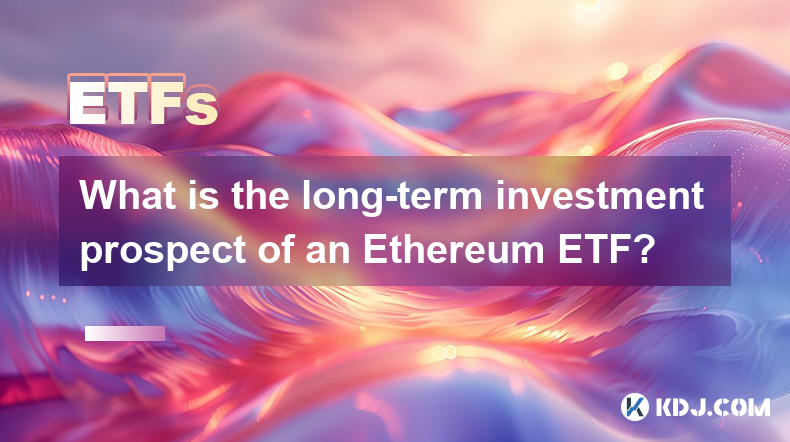
What is the long-term investment prospect of an Ethereum ETF?
Mar 18,2025 at 03:01pm
Key Points:Uncertainty surrounds the long-term prospects of an Ethereum ETF due to regulatory hurdles and market volatility.Approval hinges on regulatory clarity regarding cryptocurrencies, especially concerning investor protection and market manipulation.Successful ETF launches could boost Ethereum's price and adoption, but failure could negatively imp...
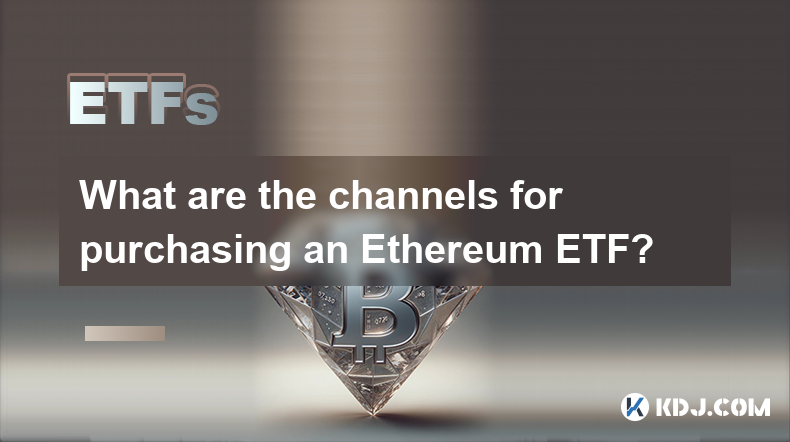
What are the channels for purchasing an Ethereum ETF?
Mar 18,2025 at 01:49am
Key Points:Currently, there are no Ethereum ETFs available for direct purchase by the general public in most major markets.Access to Ethereum exposure through ETFs is limited, mainly through futures-based ETFs.Purchasing Ethereum directly or through other investment vehicles remains a viable alternative.Regulatory hurdles and market complexities signifi...
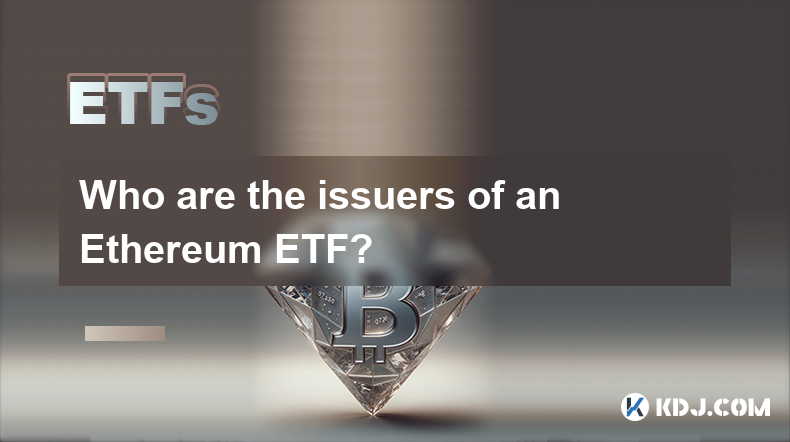
Who are the issuers of an Ethereum ETF?
Mar 19,2025 at 08:07pm
Key Points:There are no currently approved Ethereum ETFs in the US, meaning no single issuer can be definitively named. However, several firms have filed applications.The issuers of potential Ethereum ETFs will be large, established financial institutions, typically asset management companies.The specific requirements for ETF issuers are stringent and o...
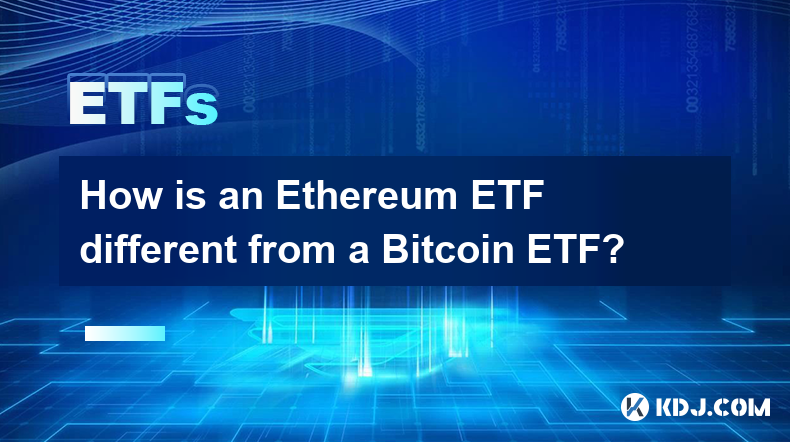
How is an Ethereum ETF different from a Bitcoin ETF?
Mar 17,2025 at 10:55am
Key Points:Underlying Asset: The core difference lies in the underlying asset: an Ethereum ETF tracks the price of Ether (ETH), while a Bitcoin ETF tracks the price of Bitcoin (BTC).Technology and Use Cases: Ethereum's blockchain supports smart contracts and decentralized applications (dApps), creating a distinct technological and investment narrative c...
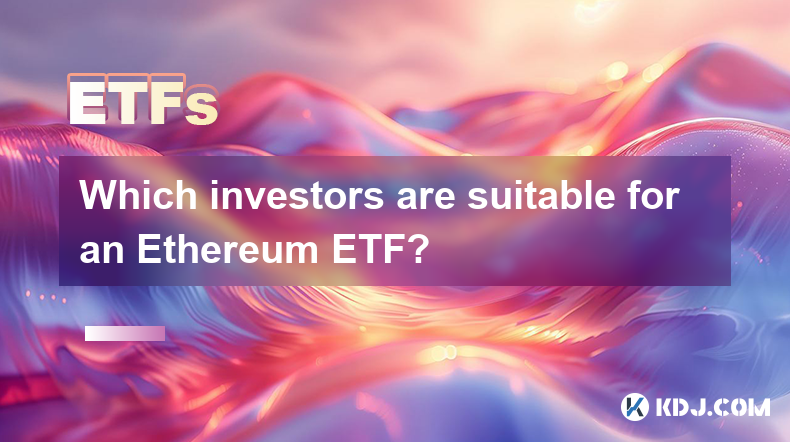
Which investors are suitable for an Ethereum ETF?
Mar 16,2025 at 05:50pm
Key Points:Risk Tolerance: Ethereum ETF investment requires a high risk tolerance due to the volatility of the cryptocurrency market.Investment Goals: Investors seeking long-term growth potential and exposure to the Ethereum ecosystem are suitable candidates.Investment Horizon: A longer-term investment horizon is crucial to weather market fluctuations.U...
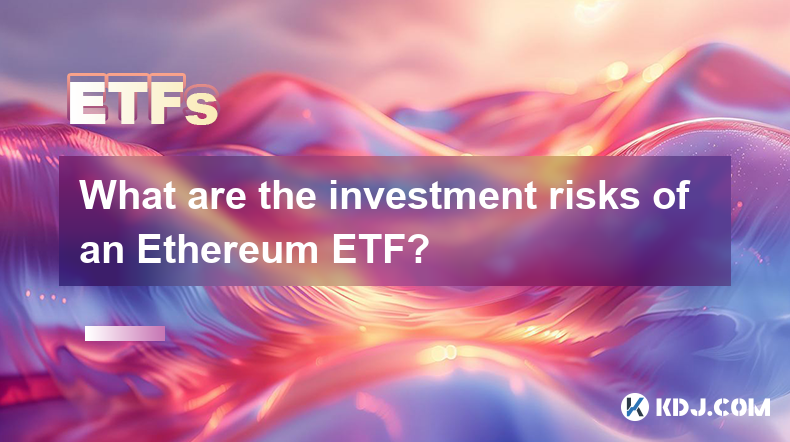
What are the investment risks of an Ethereum ETF?
Mar 18,2025 at 02:12am
Key Points:Price Volatility: Ethereum's price is highly volatile, impacting ETF share prices.Regulatory Uncertainty: Changes in regulatory landscapes can significantly affect ETF trading and performance.Market Manipulation: The potential for market manipulation, particularly in smaller ETFs, exists.Underlying Asset Risk: Risks associated with the Ethere...

What is the long-term investment prospect of an Ethereum ETF?
Mar 18,2025 at 03:01pm
Key Points:Uncertainty surrounds the long-term prospects of an Ethereum ETF due to regulatory hurdles and market volatility.Approval hinges on regulatory clarity regarding cryptocurrencies, especially concerning investor protection and market manipulation.Successful ETF launches could boost Ethereum's price and adoption, but failure could negatively imp...

What are the channels for purchasing an Ethereum ETF?
Mar 18,2025 at 01:49am
Key Points:Currently, there are no Ethereum ETFs available for direct purchase by the general public in most major markets.Access to Ethereum exposure through ETFs is limited, mainly through futures-based ETFs.Purchasing Ethereum directly or through other investment vehicles remains a viable alternative.Regulatory hurdles and market complexities signifi...

Who are the issuers of an Ethereum ETF?
Mar 19,2025 at 08:07pm
Key Points:There are no currently approved Ethereum ETFs in the US, meaning no single issuer can be definitively named. However, several firms have filed applications.The issuers of potential Ethereum ETFs will be large, established financial institutions, typically asset management companies.The specific requirements for ETF issuers are stringent and o...

How is an Ethereum ETF different from a Bitcoin ETF?
Mar 17,2025 at 10:55am
Key Points:Underlying Asset: The core difference lies in the underlying asset: an Ethereum ETF tracks the price of Ether (ETH), while a Bitcoin ETF tracks the price of Bitcoin (BTC).Technology and Use Cases: Ethereum's blockchain supports smart contracts and decentralized applications (dApps), creating a distinct technological and investment narrative c...

Which investors are suitable for an Ethereum ETF?
Mar 16,2025 at 05:50pm
Key Points:Risk Tolerance: Ethereum ETF investment requires a high risk tolerance due to the volatility of the cryptocurrency market.Investment Goals: Investors seeking long-term growth potential and exposure to the Ethereum ecosystem are suitable candidates.Investment Horizon: A longer-term investment horizon is crucial to weather market fluctuations.U...

What are the investment risks of an Ethereum ETF?
Mar 18,2025 at 02:12am
Key Points:Price Volatility: Ethereum's price is highly volatile, impacting ETF share prices.Regulatory Uncertainty: Changes in regulatory landscapes can significantly affect ETF trading and performance.Market Manipulation: The potential for market manipulation, particularly in smaller ETFs, exists.Underlying Asset Risk: Risks associated with the Ethere...
See all articles





















































































